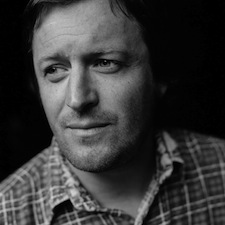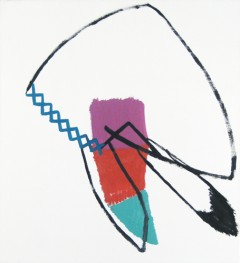Editorials Mark Baumgarten — December 28, 2012 10:57 — 0 Comments
The Monarch Drinks With Willy Vlautin
The night before I met Willy Vlautin for breakfast, a mutual acquaintance asked me what I thought of Vlautin’s voice. “Sometimes I wonder if he really needs to talk like that,†he said. “I love Willy, but I wonder if he’s holding on to that.â€
Willy’s voice had been resonating in my mind for days. A subtle mix of twang and drawl with a little gravel, it is delivered with a gentle Western cadence that seems handcrafted to deliver both well-worn axioms and bad news. There are a lot of both in Vlautin’s writing. And as I reread his debut novel, The Motel Life, it was that voice that told the story.
Vlautin’s manner of speech is ostensibly a remnant of a childhood spent in Reno, Nevada. There, Vlautin grew up around the gambling, alcoholism and general despair that anchors much of his writing. At age 14, he wrote his first song. When he turned 19, he wrote his first novel, a 150-page drunken joyride with a fictitious uncle that has never been published. The novelist has long since moved to the Pacific Northwest where he lives on a ranch just outside of Portland, Oregon. Now 44, he spends his days there caring for his horses and crafting sympathetic stories about working folks slogging through some brutally hard times. In the last seven years he has published three novels and written a few more, all while writing and playing songs as front man for an American roots band called Richmond Fontaine.
Early in the fall Vlautin finished the draft manuscript for his fourth novel, a story about nursing and the burden of long-term care called The Free. Shortly after, he was flown to Rome where the film adaptation of The Motel Life, starring Emile Hirsch and Dakota Fanning, was given its world premier at the Rome Film Festival. On the day we meet he is back from a week in Rome and awaiting the edits on his manuscript.
The Overlook was Vlautin’s choice. The Greek-American diner, located in gritty North Portland, could have been pulled from one of Vlautin’s books. For 40 years the diner has been serving large portions of mostly unhealthy food. The lights are low and the dark wood trim is hung with dollar-store Christmas decorations. An instrumental version of “O Holy Night†plays over the speakers. The television screens above the counter are tuned in to a news channel. They flash a tragic story. Two radio DJs tricked a nurse into giving them classified information, the nurse killed herself and now the DJs are being interviewed, their faces grief-stricken.
The Overlook menu shows a happy young family eating breakfast, but at 8 in the morning the only people that fill its booths are old men, eating alone. Most are wearing work shirts and dungarees, looking ready for a day of labor, though many are well past retirement. It would be easy and clumsy to say that the restaurant is filled with the Overlooked, but it is too irresistible to not do so.
Vlautin and I are supposed to meet at 8. It’s 8:20 by the time we realize that we have both been sitting, waiting for each other for a half hour, separated by a single booth. I slide in across from him. The waiter comes over, fills our coffee cups and gives Vlautin a glance. “We’re just a couple of dumb shits,†Vlautin announces with that voice, punctuating this bit of truth with a small smile that deepens his crows’ feet. His eyes are a soft blue. He is wearing a western shirt with pearl buttons.
Vlautin orders two eggs, over medium, with hashbrowns and ham, no toast. He wraps his hands around his cup of coffee and tells me that he only has a little time to talk. Today he is working at a nearby studio, writing songs for another singer. This is the first time he has done this type of work, but he says he likes it. He’s never been a fan of his own voice, he says, and this singer he is working with does justice to his words. “She sounds like Dusty Springfield,†he says, “if Dusty were a junkie.â€
We start in and, by the time our food arrives five minutes later, Vlautin is telling me about meeting Kris Kristofferson on the set of The Motel Life. One of the film’s directors introduced the writer to the actor by pointing out that they were both musicians.
“I was just mortified,†Vlautin tells me as he slices into a slab of ham a half-inch thick. “I don’t really like meeting people like that, people who I respect. I have a hard enough time hangin’ out with my own friends, let alone some icon.â€
In the movie Kristofferson plays a used car salesman who acts as a father figure to Vlautin’s main character, Frank. He provides the book’s hero with some rare good advice, as well as the car that Frank and his hard luck brother, Jerry Lee, use to momentarily escape their troubled life in Reno.
The movie was filmed almost entirely in Reno, Vlautin says, including a scene where Kristofferson occupies the very same booth in which Vlautin had his first adult dinner some time in the middle of the 1980s. Vlautin is complimentary of the movie, saying that it “was pretty dead-on to the book, in a heart way.†It easily could have gone another direction. Vlautin has no creative control over the film versions of his books. When he sells the option, which he has done for all three, he makes only one request; that he be allowed to provide notes to the director.
“The way I look at it is that either you don’t sell it and you try to do it yourself,†he says, “or you sell it and you walk away. And I like the novel more than anything else, so I’d rather just spend my time writing novels.â€
The Overlook is beginning to lighten up. The booths are filling with a few couples. One family sits down near us. People laugh. The Christmas music begins to feel appropriate. Our plates are taken away.
The last two times the waiter has come by with the coffee pot, Vlautin has begged him off. He checks the time and then tells me a little about The Free, the novel he has spent the last four years writing and plans to publish in early 2014. He says that the story, which follows the loosely intertwined lives of a nurse, a worker in a group home and a wounded young veteran, might be a little too intense. He doesn’t seem too bothered.
“I don’t know, man, that’s what I wrote,†he says before heading to the studio. “Now I’m gonna write an alcoholic cowboy novel to get my head out of being serious.â€
The answer isn't poetry, but rather language
- Richard Kenney




